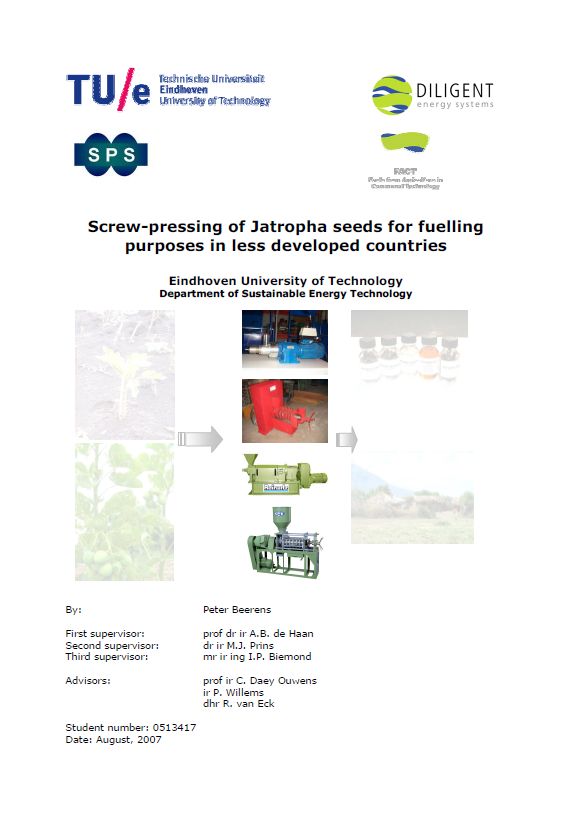Screw-pressing of Jatropha seeds for fuelling purposes in less developed countries

People living in the poorest regions in the world, e.g. large parts of the African, Asian and
Latin American continents, often lack access to energy sources in general. One approach
to provide these people with energy to increase living standards is to enable them to
produce energy from local resources. A promising local renewable energy source for
people living in tropical regions is Jatropha Curcas L; a plant that grows oil yielding seeds
that contain 31-38% oil.
The seeds need to be processed in order to obtain the useful end product oil. Mechanical
screw pressing is the most popular method in the world to separate oil from vegetable
oilseeds on small to medium scale. Therefore the impact of several variables on oil
recovery, oil quality and energy costs for screw pressing is reviewed in this report. The
main question to be answered in this report is:
• How can oil recovery, energy input and cost of Jatropha seed expression in screw
presses be optimized while retaining a quality that complies with international fuel
standards?
Additional consideration of the practical application of screw presses for the production of
Jatropha oil in Tanzania led to answers to the following two additional questions.
• What is the optimal setup for the production of Jatropha oil in Tanzania?
• In what way can rural areas in which their use is anticipated benefit from Jatropha
cultivation?
Two distinct low capacity screw presses were used; one located in the Netherland and the
other one in Tanzania. Comparing the results of test on both presses reveals which of the
two types is best suited to extract oil from Jatropha seeds. The following variables were
in advance considered of main interest:
• Size of the restriction at the end of the press chamber
• Rotational speed of the screw press shaft
• Moisture content of the seeds
• Hull content of the seeds
The most important conclusions that can be drawn from this study are as follows:
Moisture content has the strongest effect on oil recovery. Restriction size and rotational
speed of the screw are other influential parameters. The highest oil recovery measured
were 89% and 91% for the BT50 and Sayari press respectively. These values resulted
after one hour cooking in water of 70°C. Oil recovery values for untreated seeds under
standard circumstances were 79% and 87%. Important to note is that the Sayari expeller
requires dual passing of the material compared to single passing for the BT50. Additional
Jatropha press tests were conducted at two industrial German press producers in order to
put the other results into perspective. The tests conducted during this research showed
close resemblance to industrial practice. Taking into consideration all the test results
optimal oil recovery is expected at a moisture content of 2-4% after cooking at 70°C,
100% hull content and the smallest restriction size and lowest speed possible for a
certain press type.
Based on purely financial results from the ‘cost benefit analysis’ large scale centralized
processing is preferred over decentralized pressing. For similar production scale
centralization allows an ‘internal rate of return’ of 61% compared to 30-40% in case of
decentralization. However, reviewing both financial and non-financial aspects shifts
preference to decentralized pressing for Tanzania and similar countries.
Jatropha has significant added value for rural communities in Tanzania. For a village of
9000 inhabitants Jatropha cultivation has an added value between $12,750 and $54,500
depending on seed yield, which is equivalent to approximately 100 annual minimum
wages. Oil processing on village scale without the intervention of commercial firms seems
preferable over mere seed selling if coupled to electricity generation and maize milling.
100 acres of Jatropha could easily provide an additional $1,500 per annum, which is
equivalent to 19 monthly salaries to be divided between the initiators.
